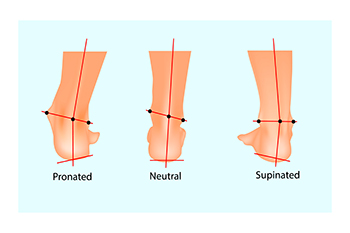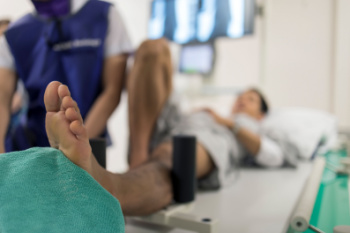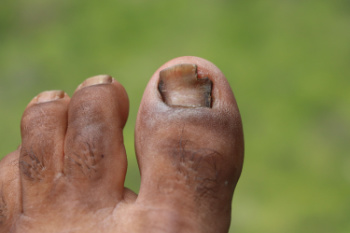Items filtered by date: October 2024
Are Bunions Affecting Your Everyday Life?
Foot Pronation and its Impact on the Lower Back

Foot pronation, particularly common in women due to factors like hip structure and footwear choices, can contribute to low back pain. Pronation occurs when the foot rolls inward excessively during walking or running, leading to an uneven distribution of weight. This misalignment creates a chain reaction that affects posture, causing the knees to rotate inward and the hips to tilt, placing strain on the lower back. Over time, this improper alignment can lead to muscle fatigue, joint stress, and chronic low back pain. Women are more susceptible due to wider hips and often wearing shoes with poor arch support. A podiatrist can help by evaluating gait and prescribing custom orthotics to correct foot alignment, offering support where it is needed most. Proper orthotics reduce pronation, relieve pressure on the lower back, and improve overall posture, helping to alleviate pain and prevent future issues. If you are experiencing low back pain, it is suggested that you make an appointment with a podiatrist to see if the biomechanics of your feet can be improved.
If you have any concerns about your feet, contact Brandon M. Zuklie, DPM from New Jersey. Our doctor can provide the care you need to keep you pain-free and on your feet.
Biomechanics in Podiatry
Podiatric biomechanics is a particular sector of specialty podiatry with licensed practitioners who are trained to diagnose and treat conditions affecting the foot, ankle and lower leg. Biomechanics deals with the forces that act against the body, causing an interference with the biological structures. It focuses on the movement of the ankle, the foot and the forces that interact with them.
A History of Biomechanics
- Biomechanics dates back to the BC era in Egypt where evidence of professional foot care has been recorded.
- In 1974, biomechanics gained a higher profile from the studies of Merton Root, who claimed that by changing or controlling the forces between the ankle and the foot, corrections or conditions could be implemented to gain strength and coordination in the area.
Modern technological improvements are based on past theories and therapeutic processes that provide a better understanding of podiatric concepts for biomechanics. Computers can provide accurate information about the forces and patterns of the feet and lower legs.
Understanding biomechanics of the feet can help improve and eliminate pain, stopping further stress to the foot.
If you have any questions please feel free to contact our offices located in Piscataway, Jamesburg, and Branchburg, NJ . We offer the newest diagnostic and treatment technologies for all your foot and ankle needs.
What Causes Bunions?

A bunion is a bony protrusion that forms at the base of the big toe, causing the toe to angle inward toward the other toes. This deformity can lead to pain, swelling, and difficulty finding comfortable footwear, and can significantly affect daily activities. The primary causes of bunions include genetics, wearing improper footwear, especially tight or high-heeled shoes, and certain foot structures. When the big toe is forced out of alignment, it places increased pressure on the joint, leading to inflammation and pain. Even after treatment, bunions can return if underlying factors, like shoe choice or foot mechanics, are not addressed. Treatment options include conservative measures like wearing supportive shoes and using custom orthotics to reduce pressure, as well as more invasive solutions like surgery for severe cases. If you have a bunion or are experiencing foot pain, it is suggested that you schedule an appointment with a podiatrist to discuss treatment options for relief, tailored to your needs.
If you are suffering from bunion pain, contact Brandon M. Zuklie, DPM of New Jersey. Our doctor can provide the care you need to keep you pain-free and on your feet.
What Is a Bunion?
Bunions are painful bony bumps that usually develop on the inside of the foot at the joint of the big toe. As the deformity increases over time, it may become painful to walk and wear shoes. Women are more likely to exacerbate existing bunions since they often wear tight, narrow shoes that shift their toes together. Bunion pain can be relieved by wearing wider shoes with enough room for the toes.
Causes
- Genetics – some people inherit feet that are more prone to bunion development
- Inflammatory Conditions - rheumatoid arthritis and polio may cause bunion development
Symptoms
- Redness and inflammation
- Pain and tenderness
- Callus or corns on the bump
- Restricted motion in the big toe
In order to diagnose your bunion, your podiatrist may ask about your medical history, symptoms, and general health. Your doctor might also order an x-ray to take a closer look at your feet. Nonsurgical treatment options include orthotics, padding, icing, changes in footwear, and medication. If nonsurgical treatments don’t alleviate your bunion pain, surgery may be necessary.
If you have any questions, please feel free to contact our offices located in Piscataway, Jamesburg, and Branchburg, NJ . We offer the newest diagnostic and treatment technologies for all your foot care needs.
Stress Fractures of the Foot and Ankle

Stress fractures are small cracks in the bone caused by repetitive stress, often affecting athletes or those who suddenly increase their activity levels. Common symptoms include localized pain that worsens with activity, swelling, tenderness, and sometimes bruising surrounding the affected area. You may also notice pain that eases with rest but returns when you resume activity. Treatment typically involves resting the affected foot or ankle to allow the bone to heal. In more severe cases, a podiatrist might recommend immobilization with a brace or boot to protect the fracture. Gradual return to activity guided by a podiatrist is vital to preventing recurrence. If you suspect a stress fracture or experience persistent foot or ankle pain, it is suggested that you schedule an appointment with a podiatrist. This type of doctor can perform a thorough evaluation and recommend an effective treatment plan to ensure a full recovery.
Activities where too much pressure is put on the feet can cause stress fractures. To learn more, contact Brandon M. Zuklie, DPM from New Jersey. Our doctor can provide the care you need to keep your pain free and on your feet.
Dealing with Stress Fractures of the Foot and Ankle
Stress fractures occur in the foot and ankle when muscles in these areas weaken from too much or too little use. The feet and ankles then lose support when walking or running from the impact of the ground. Since there is no protection, the bones receive the full impact of each step. Stress on the feet can cause cracks to form in the bones, thus creating stress fractures.
What Are Stress Fractures?
Stress fractures occur frequently in individuals whose daily activities cause great impact on the feet and ankles. Stress factors are most common among:
- Runners
- People affected with Osteoporosis
- Tennis or basketball players
- Gymnasts
- High impact workouts
Symptoms
Pain from the fractures occur in the area of the fractures and can be constant or intermittent. It will often cause sharp or dull pain with swelling and tenderness. Engaging in any kind of activity which involves high impact will aggravate pain.
If you have any questions please feel free to contact our offices located in Piscataway, Jamesburg, and Branchburg, NJ . We offer the newest diagnostic and treatment technologies for all your foot and ankle needs.
Early Detection of Toenail Fungus

Early detection of toenail fungus is essential for effective treatment and prevention of complications. Addressing the condition in its initial stages can significantly reduce the risk of the infection spreading to other nails or worsening over time. When identified early, treatment options are generally more straightforward and less invasive, often involving topical antifungal medications. Prompt intervention also helps prevent the toenail from becoming thickened, brittle, or discolored, which can lead to more severe discomfort and difficulty in finding suitable footwear. Furthermore, early diagnosis is particularly important for individuals with underlying health conditions, such as diabetes, who are at higher risk for complications. If you see the beginning stages of toenail fungus, it is suggested that you schedule an appointment with a podiatrist who can offer you treatment remedies, which often includes prescribed medication.
For more information about treatment, contact Brandon M. Zuklie, DPM of New Jersey. Our doctor can provide the care you need to keep you pain-free and on your feet.
Toenail Fungus Treatment
Toenail fungus is a condition that affects many people and can be especially hard to get rid of. Fortunately, there are several methods to go about treating and avoiding it.
Antifungals & Deterrence
Oral antifungal medicine has been shown to be effective in many cases. It is important to consult with a podiatrist to determine the proper regiment for you, or potentially explore other options.
Applying foot powder on the feet and shoes helps keep the feet free of moisture and sweat.
Sandals or open toed shoes – Wearing these will allow air movement and help keep feet dry. They also expose your feet to light, which fungus cannot tolerate. Socks with moisture wicking material also help as well.
If you have any questions please feel free to contact our offices located in Piscataway, Jamesburg, and Branchburg, NJ . We offer the newest diagnostic tools and technology to treat your foot and ankle needs.
Foot Exercises for Arthritis

If you suffer from arthritis in your feet and ankles, incorporating gentle foot exercises into your routine can help alleviate symptoms like joint stiffness and pain. One effective stretch involves placing a book on the floor and standing on it with just the balls of your feet, keeping your heels on the ground. Lean forward while keeping your knees straight until you feel a stretch in your calves and hold it for 15 to 30 seconds. For ankle mobility, sit in a chair, lift one foot slightly off the ground, and trace the letters of the alphabet in the air. Repeat with the other foot. These exercises can improve flexibility and reduce discomfort. It is also beneficial to get personalized advice. For additional stretches and a tailored exercise plan, confer with a podiatrist. It is suggested that you schedule an appointment with this type of doctor to get professional guidance to keep your feet and ankles in optimal condition.
Arthritis can be a difficult condition to live with. If you are seeking treatment, contact Brandon M. Zuklie, DPM from New Jersey. Our doctor can provide the care you need to keep you pain-free and on your feet.
Arthritic Foot Care
Arthritis is a joint disorder that involves the inflammation of different joints in your body, such as those in your feet. Arthritis is often caused by a degenerative joint disease and causes mild to severe pain in all affected areas. In addition to this, swelling and stiffness in the affected joints can also be a common symptom of arthritis.
In many cases, wearing ill-fitting shoes can worsen the effects and pain of arthritis. Wearing shoes that have a lower heel and extra room can help your feet feel more comfortable. In cases of rheumatoid arthritis, the arch in your foot may become problematic. Buying shoes with proper arch support that contour to your feet can help immensely.
Alleviating Arthritic Pain
- Exercises that stretch the foot can prevent further pain and injury and increase mobility
- Most of the pain can be alleviated with anti-inflammatory drugs, heat, and topical medications
- Massages can help temporarily alleviate pain.
It is best to see your doctor for the treatment that is right for your needs and symptoms. Conditions vary, and a podiatrist can help you determine the right method of care for your feet.
If you have any questions, please feel free to contact our offices located in Piscataway, Jamesburg, and Branchburg, NJ . We offer the newest diagnostic tools and technology to treat your foot and ankle needs.

